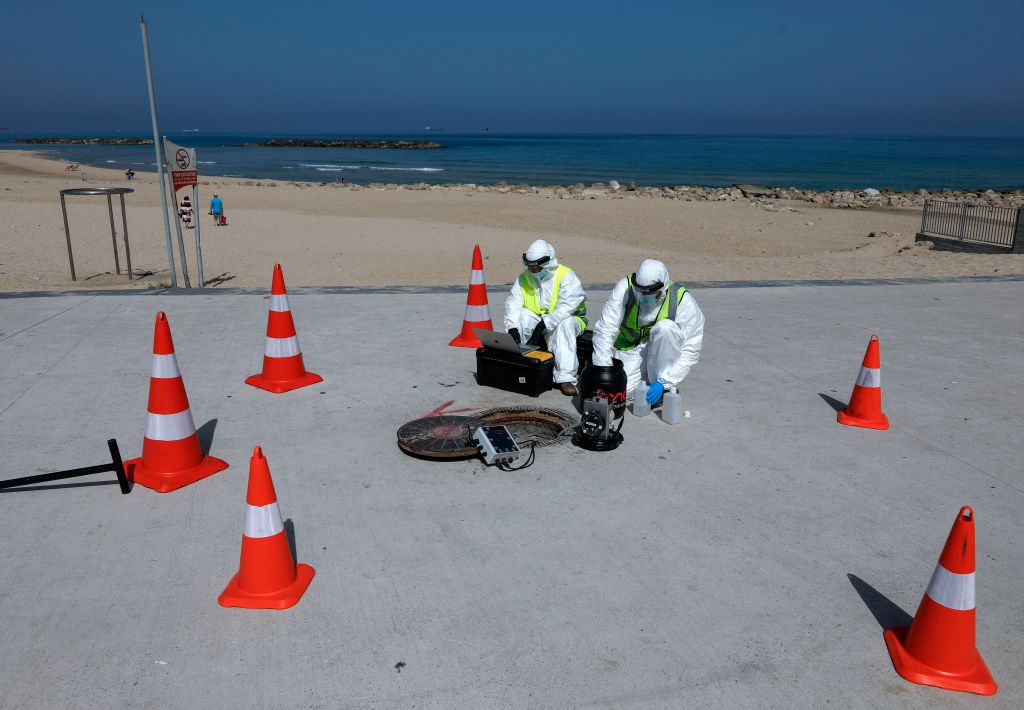CDC is working to create a COVID-19 wastewater surveillance system as sewage samples prove effective


A free daily email with the biggest news stories of the day – and the best features from TheWeek.com
You are now subscribed
Your newsletter sign-up was successful
Testing wastewater for a deadly virus isn't new — it has been used to identify polio outbreaks — but the idea has gained traction as cities and universities look for ways to plod toward normalcy as the world awaits a safe and effective COVID-19 vaccine. Universities have had great success monitoring for COVID-19 flare-ups by testing wastewater, or "all the dirty stuff from the toilets, showers, sinks, washing machines, dishwashers, you name it," Politico reports. And now "the CDC and HHS are working on a national wastewater surveillance system and data portal" for willing states and local governments.
People shed the coronavirus in their waste days before they show signs of illness, so finding COVID-19 in wastewater can give authorities "seven precious days for intervention," said Ian Pepper at the University of Arizona. His team tested the wastewater outside dorms every morning, but monitoring samples of sewage in Baton Rouge predicted an outbreak two weeks after Louisiana's governor lifted restrictions — then tracked the sharp decline in infections after the governor started requiring people to wear masks.
Setting up a nationwide wastewater surveillance system early in the pandemic would have helped alert officials before an outbreak took hold, says David Larsen, an epidemiologist and public health expert at Syracuse University, one of the schools that tests wastewater. "My kids would be in school right now. Our economy would not have tanked the way that it has."
The Week
Escape your echo chamber. Get the facts behind the news, plus analysis from multiple perspectives.

Sign up for The Week's Free Newsletters
From our morning news briefing to a weekly Good News Newsletter, get the best of The Week delivered directly to your inbox.
From our morning news briefing to a weekly Good News Newsletter, get the best of The Week delivered directly to your inbox.
And testing every U.S. ZIP code twice a week would cost about $3 billion a year, Larsen estimates. "It's really not much. The cost per person monitored is like $10, if that, a year." The payoff, he said, is it "would be huge to get us back to work" for the year before a vaccine becomes widely available.
A free daily email with the biggest news stories of the day – and the best features from TheWeek.com
Peter has worked as a news and culture writer and editor at The Week since the site's launch in 2008. He covers politics, world affairs, religion and cultural currents. His journalism career began as a copy editor at a financial newswire and has included editorial positions at The New York Times Magazine, Facts on File, and Oregon State University.
-
 Quiz of The Week: 14 – 20 February
Quiz of The Week: 14 – 20 FebruaryQuiz Have you been paying attention to The Week’s news?
-
 The Week Unwrapped: Do the Freemasons have too much sway in the police force?
The Week Unwrapped: Do the Freemasons have too much sway in the police force?Podcast Plus, what does the growing popularity of prediction markets mean for the future? And why are UK film and TV workers struggling?
-
 Properties of the week: pretty thatched cottages
Properties of the week: pretty thatched cottagesThe Week Recommends Featuring homes in West Sussex, Dorset and Suffolk
-
 Trump HHS slashes advised child vaccinations
Trump HHS slashes advised child vaccinationsSpeed Read In a widely condemned move, the CDC will now recommend that children get vaccinated against 11 communicable diseases, not 17
-
 FDA OKs generic abortion pill, riling the right
FDA OKs generic abortion pill, riling the rightSpeed Read The drug in question is a generic version of mifepristone, used to carry out two-thirds of US abortions
-
 RFK Jr. vaccine panel advises restricting MMRV shot
RFK Jr. vaccine panel advises restricting MMRV shotSpeed Read The committee voted to restrict access to a childhood vaccine against chickenpox
-
 Texas declares end to measles outbreak
Texas declares end to measles outbreakSpeed Read The vaccine-preventable disease is still spreading in neighboring states, Mexico and Canada
-
 RFK Jr. shuts down mRNA vaccine funding at agency
RFK Jr. shuts down mRNA vaccine funding at agencySpeed Read The decision canceled or modified 22 projects, primarily for work on vaccines and therapeutics for respiratory viruses
-
 Measles cases surge to 33-year high
Measles cases surge to 33-year highSpeed Read The infection was declared eliminated from the US in 2000 but has seen a resurgence amid vaccine hesitancy
-
 Kennedy's vaccine panel signals skepticism, change
Kennedy's vaccine panel signals skepticism, changeSpeed Read RFK Jr.'s new vaccine advisory board intends to make changes to the decades-old US immunization system
-
 Kennedy ousts entire CDC vaccine advisory panel
Kennedy ousts entire CDC vaccine advisory panelspeed read Health Secretary RFK Jr. is a longtime anti-vaccine activist who has criticized the panel of experts
